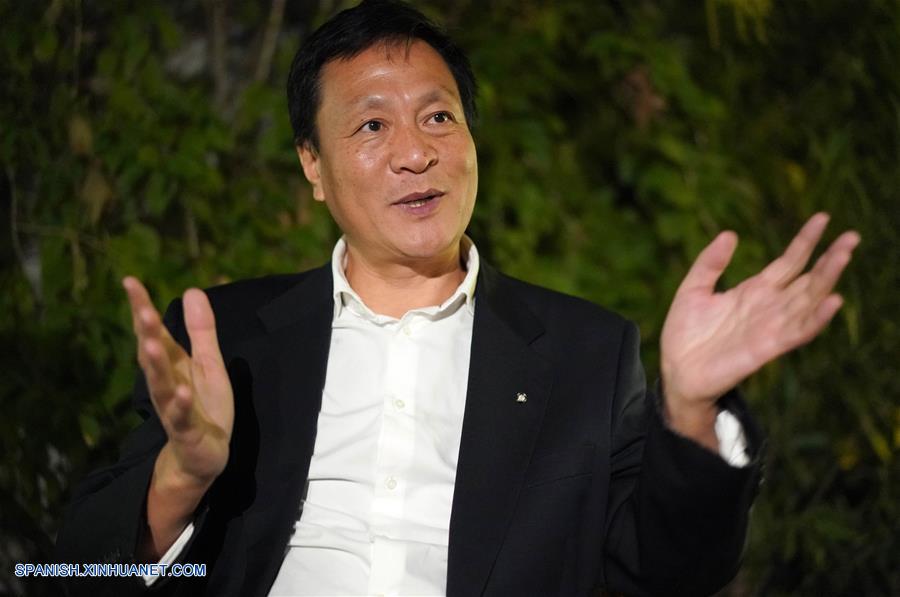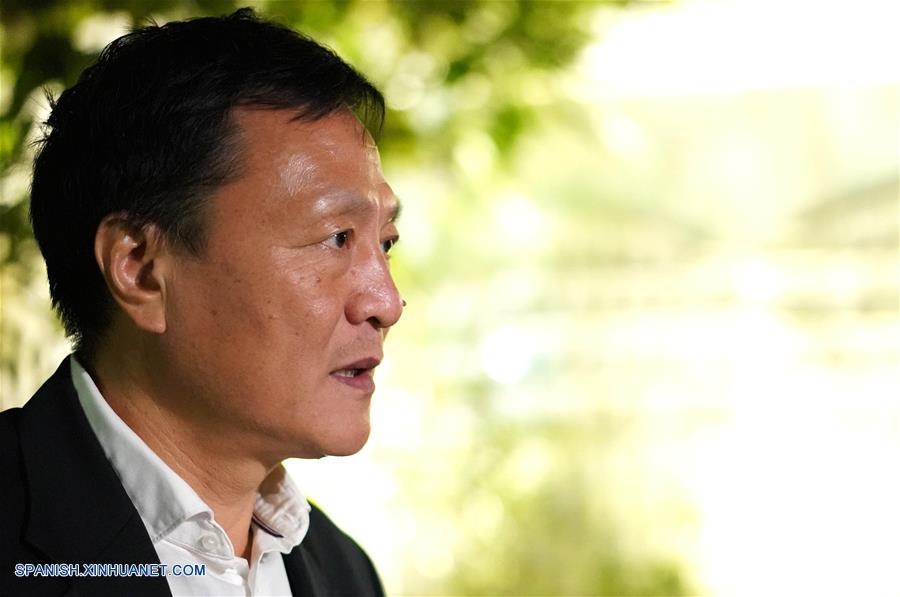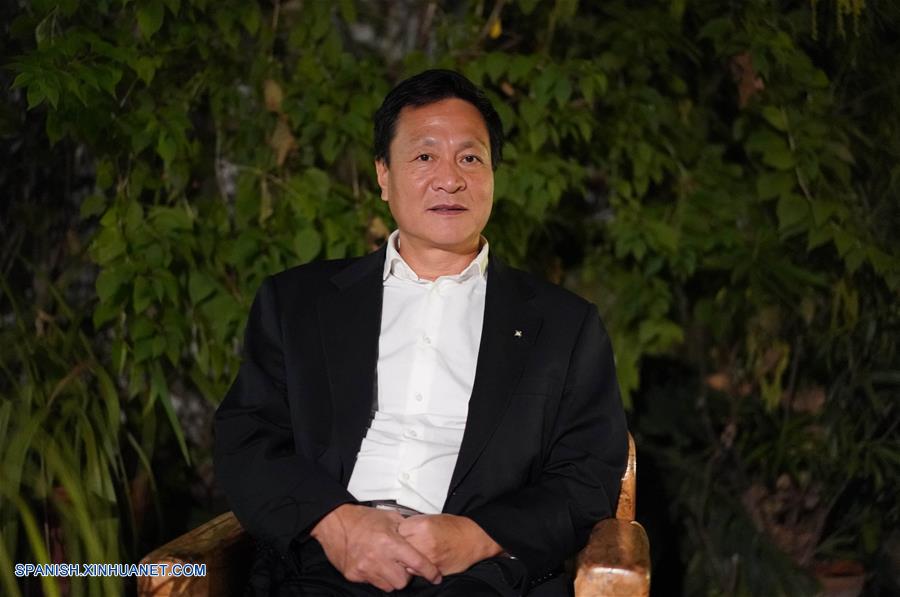INTERVIEW: Architect Yu Kongjian proposes that China and Mexico share wisdom to protect the environment

Image of November 20, 2019 of the Chinese architect and world leader in ecological urban planning, Yu Kongjian, during an interview in Mexico City, capital of Mexico. China and Mexico have in common an ancient wisdom about nature and knowledge should be shared to protect the environment, Kongjian said during an exclusive interview with the Xinhua News Agency. (Xinhua / David of Peace)
MEXICO, Nov. 24 (Xinhua) - China and Mexico have in common an ancient wisdom about nature, and knowledge should be shared to protect the environment, Chinese architect and world leader in green urban planning, Yu Kongjian, told Xinhua.
Visiting Mexico City, the renowned landscape and academic architect recalled that the two countries maintain a good economic and commercial relationship, but considered that they could cooperate in environmental solutions.
The ancestral cultures of Mexico knew the natural cycles, understood that water is life and some created floating gardens for their crops, a wisdom that would have to be recovered to boost ecological infrastructure that solves city problems, he proposed.
He explained that he was inspired by the ancient Chinese agricultural wisdom for the concept he developed of Sponge Cities, which manages rainwater to solve floods in cities while creating green infrastructure.
"We have very good economic relations, we have commerce. China consumes food from Mexico, but eventually we must share, first, knowledge," said Yu, founder and principal designer of the Chinese urban design and planning firm Turenscape.
He said that China and Mexico are among the most populous countries in the world, and are exposed to the effects of climate change, which he raised as another reason to cooperate in environmental protection.
MEXICO-MEXICO CITY-CHINA-ENVIRONMENT

Image of November 20, 2019 of the Chinese architect and world leader in ecological urban planning, Yu Kongjian, during an interview in Mexico City, capital of Mexico. China and Mexico have in common an ancient wisdom about nature and knowledge should be shared to protect the environment, Kongjian said during an exclusive interview with the Xinhua News Agency. (Xinhua / David of Peace)
The Sponge Cities solution investigated by Yu takes advantage of nature to absorb, clean and use rainwater, reducing the use of artificial concrete drainage and flooding in monsoon seasons.
As the name implies, the Sponge Cities absorb excess water during the rains through terraces and ponds that retain it, filter and release it for use during the dry seasons.
More than 200 cities in China have applied the concept that replaces the expensive concrete infrastructure with a green landscape, in addition to that it became the guiding theory of the Chinese government for land use planning and urban ecological restoration.
"The key is a solution based on nature, the key is to use nature instead of infesting with a lot of energy and a lot of money gray infrastructure such as pipes, concrete walls, dams, to control nature," he said.
Yu is president of the School of Architecture and Urban Design of the University of Beijing, and his extensive curriculum covers the publication of 25 books, more than 300 articles and conferences or classes as a guest professor around the world, including Harvard University, where study.
The architect visited the capital of the country this week to give lectures at the National Autonomous University of Mexico and the Metropolitan Autonomous University, with which he would sign academic cooperation agreements, among other activities.
MEXICO-MEXICO CITY-CHINA-ENVIRONMENT
 Image of November 20, 2019 of the Chinese architect and world leader in ecological urban planning, Yu Kongjian, during an interview in Mexico City, capital of Mexico. China and Mexico have in common an ancient wisdom about nature and knowledge should be shared to protect the environment, Kongjian said during an exclusive interview with the Xinhua News Agency. (Xinhua / David of Peace)
Image of November 20, 2019 of the Chinese architect and world leader in ecological urban planning, Yu Kongjian, during an interview in Mexico City, capital of Mexico. China and Mexico have in common an ancient wisdom about nature and knowledge should be shared to protect the environment, Kongjian said during an exclusive interview with the Xinhua News Agency. (Xinhua / David of Peace)
For the teacher, the size or population density of a city is not a problem, "it's all about using nature, relying on nature to create a resilient city. The city can adapt to climate change with a wise use of natural resources, "he said.
Yu said that in recent years the Chinese government has struggled to prioritize the environment, issuing policies and regulations to protect and restore natural areas and planning at national, regional and urban levels with an emphasis on water.
He explained that it is a concept of ecological security that is fundamental for the country, because a future without water would produce migrations.
Yu Kongjian and his group participate in the projects of more than 200 Chinese cities, given the ecological and restoration movement promoted in the country.
For the architect, wetlands for the absorption of rain from the Sponge Cities become a habitat for birds and fish, and in parks during the dry seasons, in addition to the infrastructure being completed with walls, roofs and green buildings.
"It's a total paradigm shift," Yu said, adding: "We know how to do it, we know how we can recover the system based on nature, remove the concrete to make it more resilient, cleaner, based on the idea of green infrastructure."
From:Xinhuanet
Links:http://spanish.xinhuanet.com/2019-11/25/c_138580499.htm?from=singlemessage&isappinstalled=0
